- Home
- Megan Bryce
To Wed The Widow Page 6
To Wed The Widow Read online
Page 6
“You see how I must choose wisely, don’t you, Mr. Sinclair? Before I marry again, I will be with child. And how can I make any man marry me when I’ve already given him what he wants?”
The damned thing was, she was right. He could imagine a great many men losing their mind with frustration and promising her the world in order to get himself into her bed. And a great many more men balking at the same price after he’d planted a child in her.
The horrible part was they wanted the same thing.
A child, an heir.
Marriage.
But Sinclair didn’t want to marry the widow. He wanted to bed her.
And if by some twist of fate, he did get her with child, she would demand marriage.
He couldn’t deliver. The earl would never allow it.
He closed his eyes, his chin still resting in his hand. “I think there is no hope for us, Lady Haywood.”
She left him sitting on the sofa, left her dogs to watch over him as she walked to the door.
“I think you’re right, Mr. Sinclair.”
Elinor instructed her butler to escort Mr. Sinclair out and walked calmly up the stairs. When she reached the top and turned the corner, she pressed herself against the wall. Listened to heavily booted steps as they exited through the front door.
Thought of blue eyes she wanted to drown herself in, and warm, hard arms that had wrapped around her so nicely.
She could have him. She knew it.
If she could play with her usual bag of tricks. If she could whip him into a fever and let him boil and bubble until he would do anything to have her.
But he would never marry her without that need. Never marry her if she let him into her bed first.
She almost thought about putting away her plans. Whip Mr. Sinclair into a frenzy, pit him against his brother, and rely solely on hope that this time her husband could give her what she wanted. What she needed.
But there was a hard knot of fear in the pit of her stomach, and she was afraid that it was she who couldn’t have a child. That her lack of child was not because of bad timing and terrible circumstance, and yes, bad choice in husbands.
She wouldn’t marry again without proof this time that there would be a child. Wouldn’t dare risk that she’d once again chosen poorly.
Because widowhood was a step up from marriage. She had freedom. And a lot less work to her day when there wasn’t a husband to move around.
The knocker on the door rang out again and she jumped. Her heart beat and her blood raced, and she couldn’t help her smile. Couldn’t help feel excitement and joy because he’d come back.
The butler answered the door and her brother’s voice dashed all that. Unsettled her stomach and made her want to hide in her bedroom.
She tipped up her chin and tightened her fists. She turned the corner and walked down the stairs.
The butler hadn’t let him in, wouldn’t ever let him in, and Alan was saying, “Give my sister my mess–” He smiled when he saw her. “Never mind. I’ll give it to her myself.”
He didn’t try and push past the butler. He’d tried that before but Jones was a man who’d seen war. Who knew how to recognize and deal with an enemy.
“And what is your message, Alan? I do hope it’s a short one.”
She opened the door to her drawing room and Alan said over the butler’s shoulder, “Sinclair, eh? A step up this time. But not an easy win.”
His eyes were feverishly bright and she knew what he would say before he uttered the words, “But what a prize for the daughter of a swindler. To be the mother of an earl.”
Elinor sicked her Mastiffs on him.
George Sinclair smiled at the woman who has blushing up at him. He took her hand lightly in his and pulled her closer. And then pushed her down the line to the next man.
And he smiled at the next woman who took his hand and blushed up at him.
The earl watched George dance with the happy eye of a man finally getting his way, and his wife idly waved her fan next to him.
George would have to ask her to dance, he thought. His brother wouldn’t.
“Mr. Sinclair, do the women in India really wear clothing that–” The young woman glanced at her mother who sat stiffly watching them and whispered, “–bare their middle?”
“Yes,” he said. And lost interest in the conversation.
“Yes,” he said to the next inane question she asked and no to the one after that.
And when he delivered her to her mother, went in search of a drink.
Flora followed him. “If you insist on acting the part of a bored and jaded aristocrat, and a slightly foreign-looking one at that, I will be forced to beat them off with sticks. Young girls can not stand to be ignored.”
He shuddered. “Do any of them have brains, Flora?”
“It is not a usual requirement for the gentlemen of the ton, although I’m sure there is one or two women here cursed with such an affliction.”
“I’m about ready to tell Sebastian to pick one and let’s be done with it.”
“That would certainly make him very happy. I wonder who he would choose; the young lady you were smiling down upon so vacantly but a moment ago?”
“He chose you; he can’t be all that bad at it.”
She smiled at him. “Sebastian didn’t choose me. Your father did.”
George stopped. “Never!”
He turned to narrow his eyes in the general direction of his brother, though he couldn’t see the man behind the wildly towering hair of nearly every woman in attendance.
George wondered if Lady Haywood was normally in the vanguard of fashion or if it had been his sudden interest in her that had piqued society’s fickle interest.
“My father chose you, and I’ll just bet Sebastian complained long and loud. Self-righteous, know-it-all son of an earl.”
“It didn’t even occur to Sebastian to complain. I had been raised to be the wife of a lord, what more did a man need?”
And perhaps Sebastian had been right. What more did a man need?
George thought it must be something, else any old girl would do.
Would any old, or entirely too-young and supremely boring, girl do?
He pushed the unpleasant thought from his mind.
“Shall we have a go then?”
Flora looked where he was pointing at the dance floor, and she stopped waving her fan in shock.
“Oh, but. . .” She laughed. “It’s been too long for me, George. I am too old.”
“Doddering. I thought so the moment I put eyes to you. Why, there are spinsters lining the wall older than you.”
“Lining the wall, not the dance floor.”
George refused to take no for an answer.
“I’m older than you and I’m still kicking it up.”
“You have not borne four children, either.”
“Four girls, Flora. I have not forgiven you, and I shall not, until you dance with me.”
A sad, sad look crossed her face, and George held out his arm to her. “A dance. That is my price.”
“Would that the earl was so cheap.”
George shrugged as if he didn’t care at all about his brother and the wife he didn’t know loved him, and when Flora took George’s arm and allowed him to lead her to the dance floor said, “It wouldn’t even occur to Sebastian to ask. Better by far to not speak of it and let the disappointment fester.”
She smiled, shaking her head at him. “Where angels fear to tread, George.”
“I go barreling in, I know.”
They danced, not saying much, each lost to their own thoughts until Flora suddenly said, “You think I should talk to him about it.”
“There is no one more disappointed than you about this than him. Except me, of course. But I am quite tired of thinking about it, let alone talking about it.”
And, she was not his wife. There were certain punishments reserved for a husband, and listening to his wife prattle and quite possibly cry was one o
f them.
She said, “But what does one say? I’m afraid I simply can’t think how to bring it up.”
“If it were me, I’d say something wholly inappropriate like, Four girls, Sebastian? What poxy whore did you swive to deserve such a fate? This isn’t my doing.”
Flora coughed and tripped over her own foot, and when George caught her she was choking on her laughter.
He righted her, putting her back in place in the dance line, and she said, “I’ve so missed you, George.”
“Of course you have, Flora. You married Sebastian.”
She chuckled again and he said, “But if you can’t say that to him, you could always try, By gad, Sebastian, I wish we’d had just one boy. Don’t you agree?”
“It would be very hard to disagree with that.”
He nodded, and the room suddenly quieted, then burst into chatter. George breathed in air suddenly invigorated, a night suddenly scandalous.
He didn’t look to see her. He still had that image of her in her sheer gowns, the feel of her hair between his fingers. He didn’t need to look.
Flora did, and the widening of her eyes told him that the widow had outdone herself.
He didn’t look.
Flora said, “You’ve stopped chasing her then?”
He had. Unfortunately, he hadn’t stopped wanting her and he didn’t need any more memories to fuel the fire.
He escorted Flora off the dance floor, thanking her for subjecting her old bones to such physical distress simply to entertain him.
She laughed and shook her head at him, swatting him with her fan playfully.
She looked ten years younger and George heartily congratulated himself on a job well done as he tried to sneak off before he got a glimpse of her.
He didn’t think he deserved fate’s kick to the bollocks when he stepped right into her path. He’d been watching for tall blond hair held up by fairy dust and gold tinsel, and he nearly mowed her down because she stood a foot shorter than he remembered her.
Her hair hung completely unbound, no adornment in it, the waves of blond ending in little ringlets that begged to be twirled around his fingers and hands and any appendage they cared to.
Her heeled shoes must have been replaced with flat slippers because even her eyes were lower than he remembered.
He gasped, “You’re wearing dancing slippers.”
“It’s been five weeks. I thought I could ease the constrictions a bit.”
His lips smiled of their own accord, his heart danced at her outrageousness.
He said, “Do you know that in India the women wear clothing that shows their midriff?”
She cocked her head, leaned toward him.
“How scandalous.”
And then she turned and walked away.
The door to Sebastian’s library opened without a knock and he pushed his papers away, knowing it was Flora.
She never knocked, not at night when he would be alone. The household quiet and abed except for them.
She hadn’t visited him in his library late at night since Isabel had been born.
He smiled at her and she sat in the chair across from his desk and cleared her throat.
“By gad, Sebastian, I wish we’d had just one boy. Don’t you agree?”
“Er, yes.”
They sat in silence because, well, what could one say to that?
She cleared her throat again. “George is quite put out with me. With us.”
At that, at least, Sebastian had something to say.
“I will have to remind him that it is extremely unlikely he will outlive me. He will most likely die over some silly fisticuffs and never have to adorn the mantle of earl.”
“He will be relieved to hear it.”
More silence.
And then she said softly, “We could try agai–”
“No.”
She blinked and looked down at her hands folded in her lap. “May I ask why?”
Why? Why?
“You nearly died, Flora.” And even Sebastian jerked back at the gruffness of his tone.
She nodded.
He thought the subject closed, death ended all debate, but she looked back up.
“I’m only thirty. I didn’t realize until tonight just how. . .tired I’ve been feeling.”
“You are still recovering.”
“I’m not, Sebastian. I’m not still sick. I’m not still on death’s door. Isabel is healthy, just like all our girls. It is our duty to try agai–”
He pushed back his chair hard, the scraping of the heavy feet against the wood silencing her.
“I know. I know my duty; I know what the world expects from me. I am sorry to disappoint it and you and everyone.”
Her eyes were wide as she stared at him and her mouth opened once again to disagree with him.
He cut her off with, “I will not touch you again.”
Her chin raised. “I have needs, Sebastian.”
“Excuse me?”
“Needs. I assume you have them; I assume you are meeting those needs somehow. With someone. It’s not very fair that I will be denied the same since I haven’t given my husband his heir yet.”
He choked and sputtered. “Fair? Fair!”
“May I ask who?”
“Who what?”
“Who is meeting your needs. A mistress I am unaware of, a lady I sip tea with? I think a wife should know just who is satisfying her husband. To avoid awkward situations.”
He sat back down with a thud, thinking he would have liked to avoid this awkward situation.
He cleared his head with a quick shake. “You’ve been spending too much time with George.”
She bit her lip, then stood slowly. She nodded.
“Yes. He’s the only Sinclair who wishes to spend any time with me at all.”
She walked to the door and when she opened it, stopped. “Please just warn me if I am being overly friendly with a lady you are dallying with. It would be very embarrassing for me, Sebastian.”
She closed the door and Sebastian sat there. He was fairly certain his mouth was hanging open and he looked like he’d been whacked one too many times in the head.
This must all be George’s fault. Flora had been spending too much time with him and he brought chaos wherever he tarried.
Sebastian looked at the closed door and thought, his wife had needs?
Five
Elinor flirted and teased and smiled and fluttered her way through another week, another set of dinners and balls.
But not too much.
She was beginning to understand that less was more when there was actually the possibility of going through with the seduction.
She was beginning to understand that she might never find a suitable gentleman.
Mr. Framingham had smiled at her too widely, and she’d crossed him off her list.
Mr. Dorchester had accidentally touched her bottom, and she’d laughed and pinched his cheek hard enough to leave a mark. And she’d crossed him off her list.
She hadn’t seen Mr. Sinclair since she’d run in to him accidentally, and. . .he’d never been on her list.
She couldn’t cross him off, even though it would have made her feel better.
She wasn’t quite sure why she would have felt better.
Elinor took out a piece of paper and a pen from her desk. She dipped and she wrote.
A list of widowers this time, and she sighed to herself. Was she really getting that desperate?
Apparently, yes.
Widowers with children of their own already, of course, and that came with problems. Lots of problems.
Husband number one had had children. But they’d been older than her. There had still been problems but she hadn’t had to live with any of them.
But a widower young enough to give her children would already have young children.
Young children who’d lost a mother, young children who would be worried they would lose their father to his new wife.
&nb
sp; But she wrote down all the names she could think of. Ten widowers.
And if that wasn’t enough she would think of something else. Someone else. Perhaps go to the continent and find herself a Frenchman. Or another Italian. . .
Perhaps not.
But she could always, if all else failed, find herself a Scot.
A cranky, tightfisted, skirt-wearing hater of everything English.
Because even that would be better than the last name she’d written down on her short list.
Surely she’d only put him there so she could cross him off.
George Sinclair.
Or perhaps she’d written him down because he would be her last choice. . .he was at the bottom of the list.
Mrs. George Sinclair.
. . .That wasn’t good. She’d never done that before.
Elinor, Lady Ashmore.
. . .Wellington, we have a problem.
She blinked and blinked, staring at the paper and that title. She’d been Elinor, Lady Haywood, for eleven years. Through husband after husband, keeping her title.
She wasn’t searching for a new and better title but there was a certain pull to being George’s countess.
But then she laughed. Sebastian Sinclair, Earl of Ashmore, would live forever just so Elinor Rusbridge would never take that title.
She ripped off the bottom of the page, throwing Mr. George Sinclair and his Mrs. and his perhaps-one-day countess into the fire.
She watched the paper burn. Watched until it was just a pile of ash.
She turned back to her widowers and said to the empty room, “I’ve burned you off my list, Mr. Sinclair.”
Retribution raised his head to stare hopefully at her and she called him over to scratch his head lovingly.
“No, I wasn’t speaking to you. I was talking to an empty room.”
A cold, empty, boring, lifeless room.
“I won’t do it again.”
Retribution sighed like only a dog could and she petted him, his warm head heavy in her lap.
“London is squeezing in on us, isn’t it? This house is becoming too, too small.”
Her country house, the Earl of Ashmore would call it a cottage, was a four-day ride away but it tugged at her.
The dogs could run around, she could take long walks. And perhaps dispel this gloom that was beginning to weigh on her.

_preview.jpg) To Tame A Lady (The Reluctant Bride Collection)
To Tame A Lady (The Reluctant Bride Collection)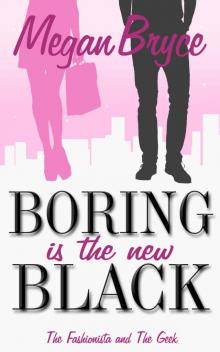 Boring Is The New Black (The Fashionista and The Geek Book 1)
Boring Is The New Black (The Fashionista and The Geek Book 1) It's Only Temporary - The Complete Collection
It's Only Temporary - The Complete Collection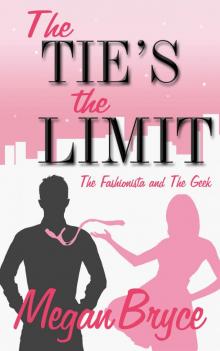 The Tie's The Limit (The Fashionista and The Geek Book 2)
The Tie's The Limit (The Fashionista and The Geek Book 2) The Reluctant Bride Collection - The Complete Box Set
The Reluctant Bride Collection - The Complete Box Set Some Like It Charming (A Temporary Engagement)
Some Like It Charming (A Temporary Engagement)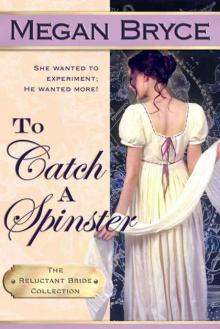 To Catch A Spinster (The Reluctant Bride Collection)
To Catch A Spinster (The Reluctant Bride Collection)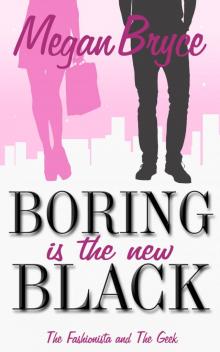 Boring Is The New Black
Boring Is The New Black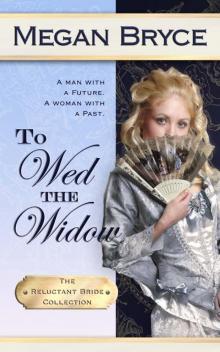 To Wed The Widow
To Wed The Widow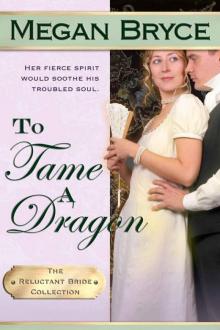 To Tame a Dragon
To Tame a Dragon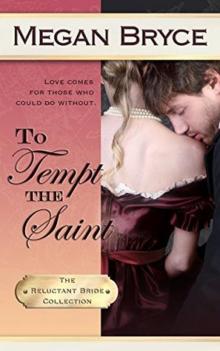 To Tempt the Saint
To Tempt the Saint The Reluctant Bride Collection
The Reluctant Bride Collection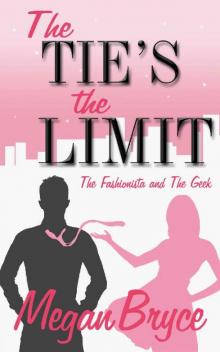 The Tie's The Limit
The Tie's The Limit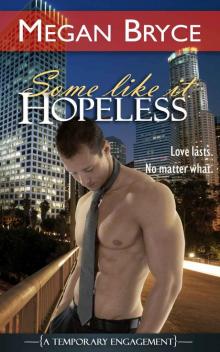 Some Like It Hopeless (A Temporary Engagement)
Some Like It Hopeless (A Temporary Engagement)